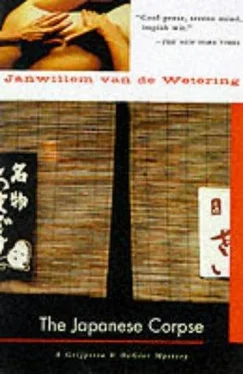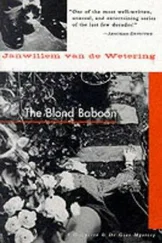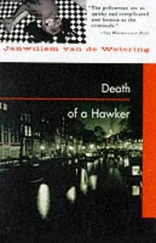Janwillem De Wetering - The Japanese Corpse
Здесь есть возможность читать онлайн «Janwillem De Wetering - The Japanese Corpse» весь текст электронной книги совершенно бесплатно (целиком полную версию без сокращений). В некоторых случаях можно слушать аудио, скачать через торрент в формате fb2 и присутствует краткое содержание. Жанр: Полицейский детектив, на английском языке. Описание произведения, (предисловие) а так же отзывы посетителей доступны на портале библиотеки ЛибКат.
- Название:The Japanese Corpse
- Автор:
- Жанр:
- Год:неизвестен
- ISBN:нет данных
- Рейтинг книги:3 / 5. Голосов: 1
-
Избранное:Добавить в избранное
- Отзывы:
-
Ваша оценка:
- 60
- 1
- 2
- 3
- 4
- 5
The Japanese Corpse: краткое содержание, описание и аннотация
Предлагаем к чтению аннотацию, описание, краткое содержание или предисловие (зависит от того, что написал сам автор книги «The Japanese Corpse»). Если вы не нашли необходимую информацию о книге — напишите в комментариях, мы постараемся отыскать её.
The Japanese Corpse — читать онлайн бесплатно полную книгу (весь текст) целиком
Ниже представлен текст книги, разбитый по страницам. Система сохранения места последней прочитанной страницы, позволяет с удобством читать онлайн бесплатно книгу «The Japanese Corpse», без необходимости каждый раз заново искать на чём Вы остановились. Поставьте закладку, и сможете в любой момент перейти на страницу, на которой закончили чтение.
Интервал:
Закладка:
The daimyo faced the commissaris and smiled and bowed.
"You like?" the daimyo asked.
"Oh yes," the commissaris said. "Very."
"Indeed," the daimyo said, and gestured at a waiter, one of the three Chinese bartenders from the Golden Dragon in Kyoto. The waiter, his skull gleaming in the soft light of the many paper lanterns hung all through the hall, shook his head so that his queue bobbed and flashed, and then made it turn, and stood under a silver disk a yard in diameter. He offered the commissaris a drink from his tray.
"A whisky, sir?"
"Surely," the commissaris said, and was conscious, while he drank, of the fact that he had danced and shouted and sung without even the excuse that the alcohol in his blood had reached a certain percentage. He had simply done as the daimyo had expected him to do, just like the time he had run and panted in the temple garden. But did it matter now? He didn't think it did. The whisky glowed in his throat while he looked into the kindly peering, bulging eyes of the daimyo.
"You like?" the daimyo asked again.
"Yes," the commissaris said. "I like."
The interval didn't last long. The bartenders brought a large red lacquered screen on which an orange dragon blazed, its fiery tongue and cruel head on the first panel, the twisting scaly body on the second and the swishing armored tail on the third. The bar disappeared behind the screen and hosts and guests looked for a place to lose their empty glasses, but the bartenders ran about, picking up the glasses and balancing their large round trays. The trumpet blew a long straight note, a resounding blast that stopped and started again on the same level, but broke with a sob and lowered away in a lamenting groan. Bass and percussion caught the almost dying note and revived it in a Thelonious Monk composition, gurgling and beeping and finishing each line in breaking glasslike sounds of the utmost right of the piano's keyboard. The commissaris grinned at the weirdly comical music but felt himself again swept up in the current that had, just now, taken him to higher regions. He thought, for a very short moment, of the possibility of restraining himself, for the sake of Dutch sense and good behavior, but resisted the temptation. The daimyo was going well and should be encouraged. And why shouldn't he, the commissaris, float on the thought power of another? He ambled to the stage and sat down next to the daimyo, and Yuiko came trotting along obediently, ready to translate.
"My court musicians," the daimyo said, "have made our nightclubs famous. I like jazz, I discovered the music in America, I often go to America. I discovered Miss Ahboombah too, one of the best dancers of New York and too expensive, I suppose, to be signed up here but I did it all the same, for a year. It turned out to be a good idea. Our clubs in Kobe and Osaka haven't had an empty chair since she began dancing there, and the clients often book weeks in advance."
"A very beautiful woman," the commissaris said, and dangled his legs contentedly. "I hope we will see her again tonight."
"But of course," the daimyo said, and tapped the commissaris' hand softly. "And there are other events on the program. I myself will try to be worthy of your attention"-he laughed and his hand touched the commissaris' sleeve-"but that may be boring for you, so afterward we'll have Miss Ahboombah again. And there'll be something to eat of course. Perhaps we should have started with the meal, but I thought that if we were all plonked down at long tables and if Yuiko had to run up and down to translate and if we had to stare at each other all the time… No."
"No," the commissaris said.
"No, no, so first we watch Miss Ahboombah. I will have to balance the feeling that exists between you and me. I frightened you not so long ago. I am sorry about that now, I saw your fear and afterward I felt guilty, although I thought, while it happened, that I had won."
"In the temple garden," the commissaris said, and went on dangling his legs. Behind him the gurgling and beeping had softened and a sweetness had crept into the music and he allowed himself to be cradled in the song of the bass and the flowing lines of the trumpet.
"But you mustn't mind that adventure," the daimyo said. "I would have been frightened too, and the trick wasn't original. I read the recipe in a book about the silver foxes of the Rokko Mountains, seven witches who lived here once, long ago now, in seven huts built in a circle. The witches thought of the torture-to show a man his own dead face. Evil women and very powerful, well-trained necromancers. They meditated, for weeks on end, like the monks in Kyoto-the good monks, not the bad ones who steal from their own temples and deliver the goods to us, nicely wrapped in cotton cloth. And the witches only wanted power, not the insight of the Buddha. Yes."
"Are you a Buddhist?" the commissaris asked. He thought he had heard a note of reverence in the daimyo's voice.
"Would I be a Buddhist?" the daimyo said, and held his broad hands upside down in front of his chest. "What would I be? A good question. I have no answer. My mind is clouded by the countless thoughts with which I have identified myself and which have all left their traces, and it is said that the Buddha mind is empty, empty and pure, for emptiness is always pure."
He thought. Yuiko's eyes seemed glued to his thick fleshy lips. "But we have cleared our minds, you and I. Jin-gi, do you remember?"
"I remember," the commissaris said, "and I asked the hotel director if he knew the word. He wrote it down for me. Two characters. 'Jin' means 'two men' and 'gf 'justice.'"
The daimyo beamed. "You remembered the word, and you have even thought about it! But that's very good, much more than I might have hoped for. You are in a foreign country and you receive many impressions, words, ideas. All day they fall on you, like raindrops, and like raindrops they roll away down the protection of your mind and are sucked up by the ground. That's what happens to me in America and I thought the same would happen to you here. But you remembered the word, the word that I gave to you on Lake Biwa. An important word that only we, the yakusa, have penetrated and truly understood. The idea, like so many ideas in our country, originates in China, but we don't always know what we are supposed to do with the Chinese wisdom, so very often we just store it somewhere, in temples mostly."
The daimyo grinned and pushed his fist softly into the commissaris' chest.
"Yes," the commissaris said. "This Jin-gi, a rule of behavior, I thought, some sort of code."
"Yes. Two men-justice. Two ideas that together form a third, and the third idea says something about human relations. The old daimyo, the man who I replaced after I had gotten myself through the war and had been appointed to a series of functions in our organization, said that two men will only be able to really meet after they have learned to destroy their own desires. Every time I saw him he would discuss that particular subject. Rather step back than jump ahead at the cost of another person."
The commissaris raised a thin hand. "At the cost of another yakusa?"
"Yes," the daimyo said "another yakusa. And when, in the end, he decided that I understood, he didn't want me to bow to him anymore. He claimed that the Japanese custom of bowing has degenerated from a greeting to an acceptance of status." He turned toward the commissaris. "Do you follow me?"
"No," the commissaris said. "To bow is to greet, I thought."
"Yes, but who bows first? That's what matters. In Japan we always try to determine one's level of life. When two men meet, someone has to bow first. Not in Jin-gi, however." He folded his hands into a praying gesture. "You see, two separate hands become one new form. You can use us, you and me as an example too. If we had met at some official event we might have had trouble bowing. You are a powerful man in Holland, but Holland is a long way off and I have my strength here, so perhaps I am of more importance, should we meet here. If that should be true, you might be expected to bow first. But we could look at the problem from another angle. You are older than I am, and you are far more experienced; you are an exotic foreigner from the West, and I am Mr. Tanaka or Mr. Tamaki, one of a hundred million creatures pushing for space on these little islands. So now what do we do? Who bows first?"
Читать дальшеИнтервал:
Закладка:
Похожие книги на «The Japanese Corpse»
Представляем Вашему вниманию похожие книги на «The Japanese Corpse» списком для выбора. Мы отобрали схожую по названию и смыслу литературу в надежде предоставить читателям больше вариантов отыскать новые, интересные, ещё непрочитанные произведения.
Обсуждение, отзывы о книге «The Japanese Corpse» и просто собственные мнения читателей. Оставьте ваши комментарии, напишите, что Вы думаете о произведении, его смысле или главных героях. Укажите что конкретно понравилось, а что нет, и почему Вы так считаете.












